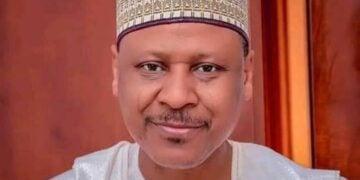Enugu State government has described its partnership with the federal government on cassava-to- bioethanol production as yielding the desired results.
The government said it was intensifying cassava cultivation in the state to boost the economy, while helping to address unemployment and insecurity.
The commissioner for agriculture and agro-industrialisation, Mr Patrick Ubru, made this known in Okpanku in Aninri local government area when he conducted round a federal government delegation on an inspection tour of cassava-bioethanol projects in Aninri, Isi-Uzo and Udi local government areas of the state, at the weekend.
Ubru informed the delegation comprising officials of the Federal Ministry of Budget, Economic and National Planning, the Infrastructure Concession Regulatory Commission, ICRC, and Prof Ken Ife, the promoter of Biosources and Technology Ltd, a private sector investor in cassava-bioethanol production in the state, of the cultivation of over 1,000 hectares of cassava farms in the three council areas last year for the pilot phase of the cassava-bioethanol project.
He observed that prior to the clearing of the large expanses of land in the said local government areas, hoodlums and kidnappers had been using the forests as their operational bases and hideouts while terrorizing the people. He disclosed that the state was set to commence the construction of over 20 kilometres of access roads to farmlands at Okpanku, adding that it had also made a 50 percent payment for the construction of a 22-kilometre road from Ikem in Isi Uzo council area to the border with Benue State.
Ubru said the state government was partnering with the federal government to establish a military base in Isi Uzo, while it was also in the process of establishing the Agro Rangers, a security outfit that would ensure safety in the farmlands.
Addressing female cooperative farmers after inspecting the farms at Okpanku in Aninri, the leader of the federal government delegation, Mr Olaifa Fatai, commended the state government for empowering women to participate in agriculture, encouraging them to take advantage of the support programmes from the state and federal governments. Fatai said the federal government was keen on producing ethanol to replace the fossil fuel, saying that what they had seen on ground justified the statistics they were given.
At the Enugu State Produce City in Ikem-Nkwo, Isi Uzo local government area, where the state government had allocated 15,000 hectares of land to Ugwu Anama Farms Ltd for the cultivation of cassava and other crops, Mr Ubru explained that Governor Peter Mbah had directed the acquisition of 120,000 hectares of land across the state for the cultivation of various crops such as cassava, rice, maize, sorghum, cotton, cucumber, cashew, oil palm, Nsukka pepper, yam, and soybean, saying the produce city project was a significant step towards transforming the agricultural sector in the state in partnership with private sector investors.
Welcoming them to the farm, the proprietor of Ugwu Anama Farms Ltd, Alhaji Friday Nnaji told the delegation that his company was using smart mechanization to transform the rural areas from dormant to productive zones, while creating jobs for over 5000 youths.
“We are not only contributing to food security in the state but we are equally fighting insecurity by engaging massively in agriculture, clearing the bushes and getting youths engaged with employment. Right now, aside the indirect workers, I have over 5000 people who are gainfully employed in my farms. So, I appreciate the vision of Dr. Peter Ndubuisi Mbah in turning the state into an agricultural state,” Nnaji said.
The traditional ruler of Ikem-Nkwo Autonomous Community, Igwe Pius Onyekachi Nnamani commended Governor Mbah for bringing development to their community. Disclosing that the community had a fruitful conversation and agreement before the land was given to the state government, he described Alhaji Nnaji as a proud son of the land who was eager to promote agriculture in the area.
Other members of the delegation were the ICRC Director Revenue, Investment and Project Finance, Odili Onu, chief monitoring evaluation officer, Ministry of Budget, Economic and National Planning, Thomas Ochepa, chief planning officer, Patricia Akigwe, among others.











